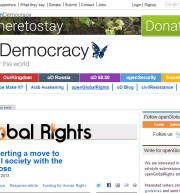
This page summarizes cases raised with Zambia by the Special Rapporteur between May 1, 2011, (when the Special Rapporteur took up his functions) and February 28, 2017 (the date of the last public release of communications). Communications are released to the public once per year. This page also contains observations on these communications and on responses received from Zambia. Communications and observations are divided into sections based upon which observation report they originally appeared. Each communication is referenced as urgent appeal (UA), allegation letter (AL), joint urgent appeal (JUA) and joint allegation letter (JAL) - the hyperlinks lead to these documents. This is followed by the date the communication was issued, as well as the case number and the State reply (also hyperlinked if available). Summaries and communications are published only in the language of submission (in the case of Zambia, English). First Report (May 1, 2011 to March 15, 2012) None Second Report (March 16, 2012 to February 28, 2013) None Third Report (March 1, 2013 to February 28, 2014) Joint allegation letter, 21/10/2013. Case no. ZMB 2/2013. State reply: None to date. Alleged undue interference with the work and organizational structure of civil society organizations. Observations The Special Rapporteur... Continue reading →

• Indian police use water cannon to end gang-rape protest in Lucknow. (The Guardian) • As King Juan Carlos abdicates, anti-monarchy demonstrators take to the streets in Spain to demand a referendum on abolishing the monarchy. (RT.com) • Bring Back Our Girls demonstrations banned for “security reasons” in Abuja, Nigeria. Ban is “insane,” says protest group’s lawyer. (The Telegraph) • 13 demonstrators arrested in protest against Albuquerque, New Mexico, USA, police (four days autopsy report revealed police had shot a homeless man in the back in March). “All we asked is to talk to the mayor,” said one protester, just before being handcuffed. (Albuquerque Journal) • British Colombia (Canada) students plan walkout to protests labor dispute between teachers and government. “We’re not taking sides,” says Grade 12 student leader. (Globe and Mail) • EU Neighborhood survey finds most of Europe’s neighbors don’t know what the term “civil society” means – but still think it can make a difference. (EU Neighborhood Info Centre) • Hungarian government raids three NGOs with ties to Norway. (Reuters) • And over the weekend, big clashes in Turkey over the one-year anniversary of the Gezi Park protests (Haaretz). Even a CNN reporter got roughed up a bit:... Continue reading →

A piece by Maina Kiai has been featured in openGlobalRights, a multi-lingual ezine that covers global human rights. In the article, Kiai discusses legislation introduced in Kenya that would have capped foreign funding to NGOs. The law looked to be a death-knell for a vibrant civil society sector that has long been a shining example for the region. Luckily, after sustained local and international pressure, the legislation was narrowly defeated in the National Assembly in December. Kenya is not out of the woods yet - the legislation may re-emerge next year. But Kiai argues that its experiences could be instructive for countries where civil society faces similar threats. Click here for a link to the piece. Update Jan. 13, 2014: The article is also now available in French.... Continue reading →